|
Versión en español
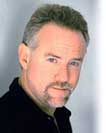 Being
as he is now the most talked about composer of the moment, we did
not want to pass the chance of interviewing “The Passion” composer.
John Debney. In our 40 minute conversation (that passed like a heartbeat)
we discovered a great person as passionate in his work as the last
film he has composed. Before we begin we would like to give our
most enthusiastic thanks to Ray Costa, great agent and better person,
who made this interview possible. Being
as he is now the most talked about composer of the moment, we did
not want to pass the chance of interviewing “The Passion” composer.
John Debney. In our 40 minute conversation (that passed like a heartbeat)
we discovered a great person as passionate in his work as the last
film he has composed. Before we begin we would like to give our
most enthusiastic thanks to Ray Costa, great agent and better person,
who made this interview possible.
Seville,
April the 2nd. 20:30(10:30 in Los Angeles)
A distant bell rings…
John Debney (JD): Debney’s Studio, Jennifer speaking…
BsoSpirit (BS): Hi, can I speak with John Debney, please?
JD: Who’s calling, please?
BS: His 10:30 interview
JD: Hold on one second please. Your Name?
BS: Sergio
JD:
Hi Sergio
BS: Hi John!!
JD: How are you?
BS: Fine thanks, and you?
JD: Very good, thanks
BS: Okay. First of all I would like to know how much time we have
to do the interview…
JD: I’ll probably say about half hour..
BS: Half hour, okay….
JD: It’s that okay?
BS: yeah, well, we wanted to talk with you about your early works
and after that centre the interview on the Passion, I suppose
I will have to shorten the questions…
JD: Well, we can do this. I’m looking
at my list and I have another interview at 11:20 so we
can take a little more. I just want five or four minutes before
the next one, so…
BS: That would be great, then…
BS:
We’re going to begin then with your TV works, if that’s
okay with you…
JD: That’s great
B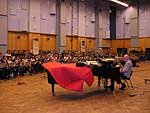 S:
Fine then. Beginning with the now extinct Seaquest DSV TV series,
what influences did you have when composing this music? S:
Fine then. Beginning with the now extinct Seaquest DSV TV series,
what influences did you have when composing this music?
JD: Well, people may guess many influences
in that work, but I must tell you that probably one of the greatest
influences for me on Seaquest was, this is rather obscure so pardon
me (laughs). There was a composer by the name of Paul Smith, who
wrote some wonderful scores for Disney in probably mid to later fifties.
Paul Smith wrote a score for a film called “20.000 Leagues
Under the Sea”, if you might recall that…
BS: Of course I do…
JD:…and I think that, interesting enough, that
was one of the earliest influences on my writing for Seaquest. And I’ll
tell you why. When I was a young child I used to watch movies that my father
brought home (he worked for Disney for a number of years). One of the movies
I used to watch was that, and I used to watch it very often ,I liked it a lot
and…I’ve always loved science fiction and the work of Jules Verne…so
when I got the opportunity of working on Seaquest I remember this was the first
thing that came into my mind, it has sort of beautiful movement and I rerecorded
that piece many years ago for Disneyland actually… so I listened to that
and to the score of “Beneath the 12 Mile Reef”…
BS: The one from Bernard Herrmann…
JD: Yeah, those two scores influenced me most greatly.
The idea of reliving two hearts on the show was very interesting for me and
obviously to try to represent the ocean orchestrally was very interesting for
me…so if you noticed there are a few cues that are very impressionistic,
and I believe one or two were greatly influenced by those two…
BS: From Seaquest to another of your TV work. This time we we’ll talk
about The Justice League of America (DC’s comic adaptation). How were
your experiences in working on an animated series…
JD: Justice League? That was a pilot that never
sold…
BS: Yeah, you’re right
JD: I thought you’ll bring you will bring up Young
Riders actually (laughs)…But it’s fun you should mention Justice
League. I loved that pilot but it never sold. And the music I did for it it’s
quite interesting. It’s all synthesized because we never had the chance
to work with a full orchestra. But actually it was fun composing that, and
the theme I quite liked it and I have never used it for anything else, so I
might do that someday (laughs). But yeah…I would say that the other major
TV show that I did for more time was Young Riders and that was a really wonderful
experience. I had influences from all over the place for that one. I drew a
lot from my youth playing on a rock-n-roll band, and we did a lot of scores
that were sort of more contemporary and guitar oriented. I would say that one
out of every 5 scores was done with the orchestra; we would wait to do some
of the more special shows with an orchestra. And I believe I won an Emmy for
that which was my first Emmy if I recall it correctly…
BS: So, did you have in mind when composing Young Riders the most obvious influences
when composing a western?
JD: I think the western genre is filled with
different styles; everything from Elmer Bernstein to Ennio Morricone
to people like Mark Knopfler…
BS: Dire Straits guitarist?
JD: yeah, there was some talk early on the development
of the series where the producers wanted the score to be sort of Knopfler music.
So we did a little of everything and that’s why it was so much fun. ‘Cos
every week there would be a different attitude towards the show and it was
quite enjoyable for me because every week I could do something different…
BS: And how much time did you have to write those scores?
JD: Basically a week…
BS: A week?
JD: Yeah, episodic television it’s very fast and
many times we will have a new episode on Monday and the following Monday we
would record, literally a week….
BS: of very rough work…
JD: Yeah, a lot of work. In Seaquest and Young Riders,
every week I was turning out for each show twenty to forty minutes of music.
So it was tough but again, free…
BS:
Moving now from TV to large screen. We want to talk about what is
probably your most known work, and I’m sure you know which
one I’m referring to…
JD: Well, there’s a couple I should say…(laughs)
BS: Cutthroat Island being one of them?
JD: (laughs) I thought you were going to say that or
Hocus Pocus…
BS: that would be the second one… but concentrating on Cutthroat Island,
there’s a sort of Urban Legend around that work. Being considered one
of your best works up to date…
JD: I’ll consider it one of my best works…
BS: I totally agree with you. The thing is that when the teaser poster first
came out the composer attached to the project was David Arnold
JD: Yeah, that’s true
B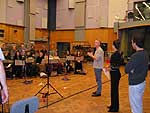 S:
but finally you were the one who did the work. What happened in between
and what truth is to be found in that some of Arnold’s work
still lives in your composition? S:
but finally you were the one who did the work. What happened in between
and what truth is to be found in that some of Arnold’s work
still lives in your composition?
JD: I’ll tell you the whole story. Basically
is the classic old story...David Arnold was on the movie, and I love
David’s work actually I think he’s a very fine composer,
but for whatever reason the music he had done for the film wasn’t
the liking of the director…and there were some added difficulties
to his work…I think he was here in Los Angeles, and he was
trying to demo his music with the synthesizers, and some of the demos
weren’t accurately enough…I’m guessing here…but
David was not to be a part of the film anymore at a point and they
hired me. There are two reasons why Renny hired me: number one is
that I have a very successful first meeting with him, number two
is that he decided to call Steven Spielberg after our meeting and
Steven was very kind and gave me a very good recommendation…
BS: Because of your work on Seaquest…
JD: yeah, and a pilot I did for Steven called Class of ’61,
which was a Civil War pilot. I also gave Renny a cd of my music and interestingly
enough I gave it to him on a Friday and I didn’t get a phone call back
until that following Monday. And I was quite depressed about it (laughs) and
what really happened is a really funny story….what happened was that
over the weekend I was at home, Renny had called my office on Saturday morning
and wanted to hire me then but he left the message there and I didn’t
get the message until Monday morning…
BS: So you were hired and you weren’t aware of it (laughs)
JD: Yeah (laughs) and that was that. And to answer the
second part of your question I have never, to this day, never ever heard one
note of David’s music because I would have never wanted to be influenced
by his music at all and I’m curious now about what he did, but no, I
didn’t hear a note of his music.
BS: So that settles this…
JD: By the way if I had I would tell you because enough
time has gone off…
BS: Yeah, we’re talking 1995…
JD:…almost ten years so…and I remember writing
the main theme (I actually wrote almost 15 main themes) and I think the one
who stood was number 5 or 6…
BS:
I don’t what to do now, jump into the Passion or continue
with some of your other works, because we’ve been talking
now for 15 minutes and…
JD: I’m sorry I’m going on so much
time…
BS: No, no problem I’m enjoying very much what you’re telling me…Well
let’s talk about two years ago…
JD: Okay
BS: In 2002 you wrote some outstanding scores for Dragonfly or The Scorpion
King…let’s centre on the Scorpion King…
JD: Okay
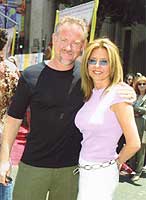 BS:
Being a movie that was sort of the third part of the saga initiated
with The Mummy and followed by The Mummy Returns (in which the character
of the Scorpion King first appeared)…did you (again) listened
to the music that Goldsmith and Silvestri wrote for those movies? BS:
Being a movie that was sort of the third part of the saga initiated
with The Mummy and followed by The Mummy Returns (in which the character
of the Scorpion King first appeared)…did you (again) listened
to the music that Goldsmith and Silvestri wrote for those movies?
JD: well, this is a different case where I
did hear both scores…I wanted to hear both scores because,
number one I admire both composers very much and number two I wanted
my score to be different…because I felt that as you mentioned,
and it’s true, this was a Mummy movie because the principal
character it’s from a Mummy movie, and yet it’s not a
Mummy movie, so I wanted to explore a little bit different territory.
And the story about this score is interesting because there were
a lot of battles in Universal about the direction of that score,
some people wanted it to be pretty much a rock-n-roll score with
some orchestral influences, other people wanted it to be all orchestral.
So really, it ended up being a little of both, I think it’s
more of an orchestral score, as the director wanted actually, but
it combines a number of different attitudes…and I’m not
saying that’s a good thing, I’m saying that’s sort
of what happened. Although it was fun, working on a score like that,
because we had the opportunity of doing different things than in
the Mummy pictures, bringing’ in some drums and guitars and
things like that because after all this is a different character,
and it’s The Rock and its’ audience, young guys that
still watched him as the wrestler. So that was sort of always spoken
about, but also I wanted to write the kind of score that integrated
elements of that time period, I also remembered the score of Lawrence
of Arabia and to me it was sort of a retelling of that story. In
the Scorpion King the Rock was a character the began being a bad
guy and ultimately becomes a hero, and it was like Lawrence of Arabia
in that sense, a guy that changes his mind and becomes a hero and
hero bigger than life. So in writing the music for The Scorpion King
those were thoughts that were in my mind. I definitely wanted to
be a little bit different of what we’ve heard in the Mummy
movies, therefore that’s why I changed consciously as much
as I could…
BS:
well, before beginning with The Passion, this is just a curiosity;
you’re credited Joe Dante’s Looney Toons: Back in Action.
Where in the movie does your music appear?
JD: Well my music appears on the end of the
film is quite a bit of the last reel. I was contacted to come in
and work with Jerry, because he wasn’t feeling so well…it
was an incredible honour for me to have been asked to work on that
film, and I did… I came in and helped out in the end of the
movie…
BS: So your work was basically to follow the patterns that Jerry had set?
JD: Yes, absolutely, they wanted me to fill
in the blanks and that’s what I did…
BS: Okay
BS: Well we finally arrive on The Passion. Again you weren’t related
to the movie from the time it was first announced…
JD: Yeah, I was not on the movie…it was
a shock for me when I got the phone call (laughs)…
BS: (laughs)…and it was a shock for…
JD: …everyone… and I must tell you Sergio,
I knew that, I knew that going in…I like to tell people that I believe
if you were to had a list of twenty composers I wouldn’t have been on
that list, because I’m not known for doing dramatic movies…
BS: Yeah, that’s right….
JD:…but not by choice, believe me, I would love
to do more dramatic movies, but needless to say that being the case, I got
a call from the producer, whose a friend o mine, in October and…it’s
a very long story and I don’t want to bore you…but basically they
were having trouble…they’ve hired a gentleman to work on the sound,
he had been on the sound for about a year and he had been recording a lot of
folk music of all around the world. At that point Mel was thinking having the
score being all indigenous music from every part of the world…
BS: Not original music…
JD: Totally, so when they started to work on the film
on post-production I think they realized they wanted the flavour of that music
but they really needed somebody to write a score that would unify all that.
SO when the producer called me in October ant told me “John we’re
in trouble and we want you to write some music…” …so that
was on a Thursday and I spent the whole weekend writing some music and told
my friend “if Mel’s interested I would like to play this music
to him, no strings attached, it would be an honour to play this music”.
So the first thing I wrote that Mel heard was the music for the trailer…
BS: Don’t tell me, the one with the female voice…
JD: Yeah, that one
BS: I love that piece…
JD: Thank you. Well, believe it or not, that was the
first piece Mel ever heard. He became on a Monday and I played the music against
the trailer (which was already done) and he responded, he loved it, he liked
the rhythm and the female voice… so then I played to him a few other
pieces of music one of them being a piece for Satan, and a couple other pieces…and
we sat about an hour together, and a little later that day I got a phone call
that Mel wanted me to join him on the film. And that’s how it happened,
so the very first piece of music that he heard was what became the trailer
music, and I might add that a lot of people really like that piece of music…
BS: yeah, it’s very powerful…
JD:…yes, and for whatever reason that was the first
thing that I came up with and Mel liked…he’s a very interesting
guy, he cut very quickly he’s got a very musical ear and he understood
that the music for the trailer was in three-four, it’s in triple time
and therefore it always seems like it’s moving forward and propelling
itself through the visuals and he liked it very much. And that’s how
it happened; I kept very quiet once I got the assignment I must tell you, we
didn’t publicised it and therefore you had all the stories going around,
and I tell you I didn’t even visited the websites because I knew (laughs)
that the controversy was whirling around…
BS: You were right (laughs)
JD: I though so…and I was smart enough not to get
into that stuff, because you know what Sergio? I figured that ultimately if
I was going to make it, if I was going to survive it would be through hard
work and my own personal prayer. And I did not wanted to be distracted by all
that…I kept myself rather isolated…and I have great support, I
have a great family and a great agent…
BS: I agree with you, I have spoken several times to Ray in trying to set this
interview and he’s a very nice person…
JD: He’s a good guy…
BS: What you were telling me about isolating yourself is that what you usually
do, or was that only for this movie?
JD: No I usually do, but more so with this
film, a lot more with this film: I just came in and did my work and
did it very quietly. I asked Ray to not say a thing because the things
going around were crazy, there were composers mentioned almost daily…so
I’m always sort of a little bit isolated and write my music
working with the director, but in this case I just kept me more to
myself, I’ll put it in this way…
B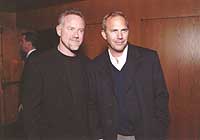 S:
Being that isolated and regarding what you told me about not listening
to what other people has wrote to similar films… S:
Being that isolated and regarding what you told me about not listening
to what other people has wrote to similar films…
JD: If I can comment about that, there’re
times when I want to hear what other composers had done. Let’s
say for example that I’m being hired to replace someone else
on a film and I have t rewrite the score or parts of the score, and
in that case some times I do want to hear what another composers
have write simply because then I can make my own mind as to “Okay,
I see the problem”…or, there have been cases, recently…which
I won’t talk about…I was brought in to re-score a very
big film, and I liked the score and I told them that I didn’t
think the problem was on the score…so there’re those
times when I have to sort of look at it very objectively, and…but
I didn’t do that in the case of The Passion…I knew the
problem with some of the music that had been written originally by
this gentleman (whom I like a lot)…it’s called experience…I
have 20 years of experience and this other man it’s very talented
but have done it as long as I have so by his experience level was
very difficult to score and he had come up with some very beautiful
themes , and some of them are in the movie actually, the ones Mel
liked we kept…so you know, there’s never a rule…
BS: But in a movie like this when you have all this background that comes from
music done for the figure of Christ by people like Alfred Newman, Miklós
Rozsa or Peter Gabriel …
JD: Yeah, but I purposely did not want to look
at any of the biblical movies that had been done before …I
just did not wanna go there, because I knew that, number one, it
was not the type of score Mel wanted…ah Mel wanted a much more
contemporary score. The only score that I would say influenced me
was Peter Gabriel’s because of the fact (I’ve never had
talk about this before (laughs)) that Mel liked the sound of the
double violin. And the double violin was a man named Shenkar whom
is a wonderful musician. Shenkar played on The Last Temptation of
Christ, extensively I would say. He also sang on it with Peter. And
Shenkar on my opinion was the co-creator, in many ways, of that score.
Mel had heard that score and liked that sound (the sound of the double
violin and the vocals) that was the same man. So I search this guy
out and it took me a month to find him in L.A, and he was brought
in with another double violinist…and so any similarities that
you can find between my work and that of Peter Gabriel…
BS:…derivates from the fact that both of you used the same musicians…
JD: Yeah, exactly (laughs) and that was really the only
reference point for my work…
BS: aha, I see. Well now I want to talk about the relation music-images that
take the most important role in the scene when Jesus fells into his knees and
Maria recalls in a beautiful flashback a similar situation in Jesus childhood.
How did you approach the music for that scene?
JD: Well, that I must tell you Sergio is one
of the two places in the film I am most asked about, the other one
being the crucifixion. But I was having a lot of difficulties getting
the music for that flashback area, great difficulty. Mel was not
happy with what I was coming with, although he was pleased with many
other areas, that was a key scene for him that I wasn’t getting.
Well I didn’t know what to do because when you reach that point
where you’ve tried everything and you can’t come up with
anything, what do you do then? Well I actually started to pray; I’m
a life one catholic, so I started pray very firmly…
BS: …no kidding?
JD: No (laughs) I did. I figured well, nothing else has
worked, so I started to pray to Mary to give me her music. And after three
days of praying I woke up one morning with that piece in my head with the lyrics
in English. And to make a long story short I demo that piece of music with
the same singer of the trailer music, and the first time I played it for Mel
I didn’t know what his reaction would be, and he was behind me in the
room while I was playing the music… at the end I turned around ad Mel
has tears coming down his face. He was absolutely touched, and I knew at that
point, that there was an opened door for me and from then on things got very
smooth and it became a wonderful process with Mel after that. And there were
rough times too, I would lie to you if I told that all was very easy…I
battled self doubt with every move I made but it was worth the effort…so
that was how I came to write that piece, I don’t think I got it myself,
I think I got it from someone else (laughs)
BS: …someone very high…
JD: …a very special someone
BS: You said it before, the other scene I wanted to talk about was the crucifixion
scene and in special where the raindrop or the tear from god falls down to
earth. I think is one of the most beautiful metaphors I’ve seen on screen
and…
JD:…you know, I think that was a stroke
of genius. There are a number of areas in the film that I would say
are genius, and that would be definitely one…
BS: It’s overwhelming…
JD: Yeah, I can’t think of a more poetic…and
it’s very interesting Sergio because Mel described that to me before
I ever saw it, of course, and I couldn’t quite visualize what he was
telling me…but they way he did it with that camera angle and the tear
forming in the lens of the camera…you know, that’s one of those
moments in film I think people will be talking about forever…
BS: Well our time is ending so I’ll only ask you two more questions.
As producer of this soundtrack, would you say this is the work which you are
most proud of?
JD: Absolutely
BS: Without any doubt…
JD: …none at all. Just because it was such a journey
for me…before that I would agree with you that Cutthroat Island was very
high on my own personal list of what I have achieved in music, because that
was also a huge monumental task that I only had three or four weeks to write
that…
B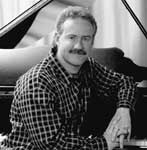 S:
only three or four weeks? S:
only three or four weeks?
JD: Yeah, I believe Cutthroat Island was at
most five weeks…but this one being on a different level of
spirituality and digging deep in my spirit…so there were things
on this score that literally …I would say it this way…you
know there’re times in all of our lives when you might write
what you think is a very well written article, and there’re
those times when you’ve finished something and then you look
back and say” God!, I don’t remember doing that!”…this
was one of those cases where I listen back to the music I wrote and
I don’t remember much of it clearly; I only remember a lot
of pray and a lot of hard work, trying to come up with something
that would affect people and honour the visuals at the same time… that
was my biggest purpose, that somehow my music could honour the images,
as I think they’re spectacular…every shot in the movie
is like a painting, the acting is superb in my opinion, I think Jim
Caviezel and Maia Morgenstern are both impressive without saying
a word…and for me to be a part of it was one of the most rich
experiences in all my life…I’m very, very happy that
when people tell me “I was driving listening to your music
and I had to pull over the car consumed by emotion!” that just
blows my mind…
BS: I was planning on asking you one more question but I think this is the
most beautiful way of ending the interview.
JD: It’s been a pleasure, you’ve
been great…
BS: It’s been a pleasure for me too and I must tell you that we have
to talk again with a lot more time to make an analysis of all your work…
JD: I would love that. Promise me that you’ll
call me and we would do that…
BS: Okay, I’ll call Ray and set a new one with him, or shall I call you?
JD: Better call him because he knows better
than me what I have to do (laughs)…But please call back
BS: Sure it would be great to talk to you about (not all, because that would
be so long) your work …
JD: Great, promise me you’ll call me
back…
BS: Okay, I promise you.
JD: Good
BS: Thanks for all
JD: God Bless you, bye
Interview
by Sergio Benitez, translation by Rubén
Sánchez
BSOSpirit
Abril 2004
|





